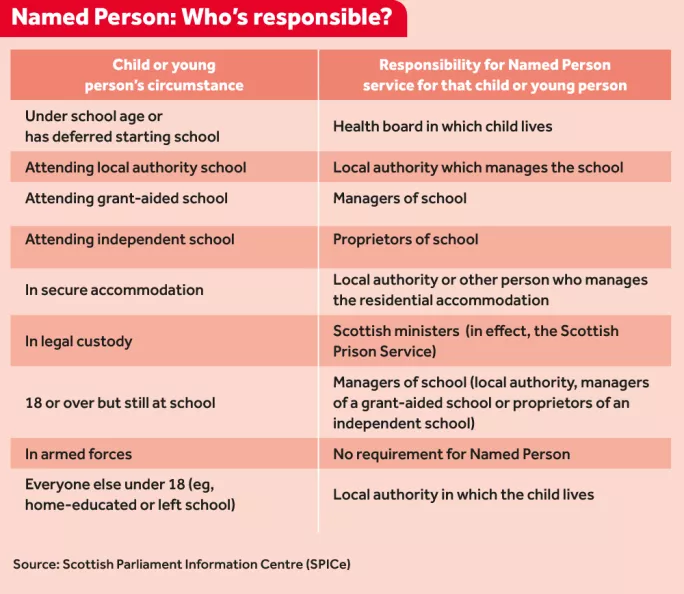Named Person ‘has lost its way’, warn parents

The passage of new legislation that covers the controversial Named Person scheme has “undermined trust” between families and professionals, according to a national parents’ organisation.
The claim was made as Named Person again came under scrutiny in Parliament, with MSPs now appearing likely to vote on whether a much-criticised code of practice - drawn up to help teachers and other professionals make sense of the scheme - should be approved.
Named Person would provide each under-18 in Scotland with a single point of contact - often a teacher or headteacher - to oversee their welfare, but the scheme hit a stumbling block last year when the Supreme Court in London ruled that it could “give rise to disproportionate interferences” in family life.
In evidence to MSPs this week, Eileen Prior, executive director of the Scottish Parent Teacher Council (SPTC), wrote that the passage of the legislation around Named Person “has been a bruising and damaging one for government and led to a great deal of confusion and concern for families and professionals alike”, adding: “Most critically, it has undermined trust between families and those who are in roles that should provide help and support where it is needed.” Ms Prior said the SPTC has always recognised that the intention of the legislation was “benign”, but said that it had “lost its way in the drafting of the Named Person service”.
She added that a “good deal of damage has been done” and that the government would “have to work hard … to remedy the situation”.
‘Lack of clarity’
A Scottish government spokeswoman said: “The Named Person service means that someone will always be available to help a child and their family if and when they need it - it is an entitlement with no obligation to accept any support offered.”
She added: “It builds on and clarifies the role of promoted teachers who already have responsibilities for providing advice, information and support to children and parents. ”

Last week, MSPs said that Holyrood should have a final vote on a code of practice that will set out how proposed changes to Named Person will work. Scrutiny of the relevant Bill has revealed concerns that the draft code - drawn up by the government after last year’s Supreme Court ruling - does not offer enough clarity and it would not be set out in legislation.
This was considered by Holyrood’s Delegated Powers and Law Reform Committee, which concluded that the code was “more than simply an explanatory document”. Its report said that “it would be appropriate for the final version of the code to be subject to approval by the Parliament”. Committee convener Graham Simpson said: “We explored the code of practice with [deputy first minister and education secretary John Swinney], who viewed it as an explanatory document. Our committee considers the code to be more significant than that.”
Mr Simpson added: “It has a central role in the operation of the sharing of information about children and young people - and it places obligations upon professional people such as social workers, teachers and healthcare employees.”
The government said that it would consider the committee’s recommendations. “We are committed to ensuring that Parliament has a full opportunity to scrutinise the Bill and the code, and are working actively with a wide range of stakeholders to ensure the code offers clarity to all those who will need to use it,” said a spokeswoman.
Last month, Tes Scotland reported teachers’ concerns - presented to the Parliament’s Education and Skills Committee - that a lack of precision around terms such as “wellbeing” in relation to Named Person could result in schools making mistakes and getting into legal trouble (“Making a ‘dog’s dinner’ of Named Person legislation”, 13 October).
The Scottish Council of Independent Schools stated that “the definition of wellbeing is so broad that different practitioners will interpret this in various ways”.
You need a Tes subscription to read this article
Subscribe now to read this article and get other subscriber-only content:
- Unlimited access to all Tes magazine content
- Exclusive subscriber-only stories
- Award-winning email newsletters
Already a subscriber? Log in
You need a subscription to read this article
Subscribe now to read this article and get other subscriber-only content, including:
- Unlimited access to all Tes magazine content
- Exclusive subscriber-only stories
- Award-winning email newsletters